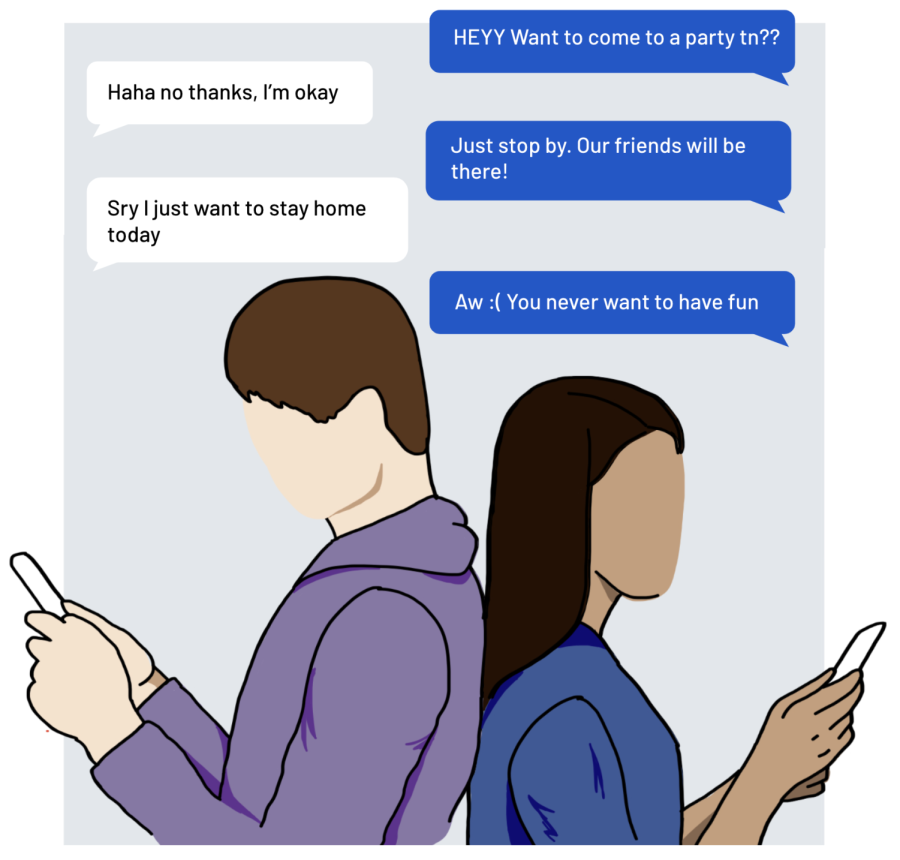OPINION: People should abandon creating misconceptions about introverts
Such misconceptions depict introverts as a monolith which is harmful for many.
There is a party happening. Everybody is having fun, but someone is in the corner of the room alone. Their body language shows that they clearly are not comfortable and they do not want to be at the party. People are talking in the background, saying things such as, “What is their problem?” or “Why are they just all alone over there?” or “Why don’t they just come here and have fun with us?” The person these partygoers are talking about is an introvert. Introverts are misunderstood, garnering many harmful stereotypes and misconceptions.
One of the hurtful misconceptions introverts live with is that they do not have fun, according to Sophia Dembling in an article on Psychologytoday.com. This idea can be detrimental because it insinuates that introverts are boring or misanthropic. Sometimes an introvert’s way of having fun involves little to no friends, but this does not mean they do not like people.
Christine Schoenwald on Introvertdear.com says that another common misconception is that introverts have no emotions. Introverts are not robots. They may not dramatically display their sentiments for everyone to see, but they have emotions like everybody else. The difference is introverts often internalize their feelings and save them for when they are alone and can process them on their own. Introverts are like the voice of reason – they keep everyone calm under stress but do not go to others for all their problems.
Feeling like they lack conventional social skills, some introverts may only feel comfortable in certain situations. Most introverted people also tend to have low social batteries, and psychologist Kendra Cherry states in an article on Verywellmind.com that they can be quickly exhausted by a lot of talking with others. Even the mere thought of prolonged socializing can cause introverts anxiety. Further, introverted people do not necessarily need a ton of friends and are often content being alone, but, unfortunately, not everyone understands or accepts that.
While introverts have to live with stereotypes and misconceptions about them, some also deal with people taking them outside of their comfort zone into potentially distressing situations and places. For example, a teacher may rearrange their seating chart and two random students – one of them an introvert – must sit next to each other, or when extroverted friends force introverts to attend parties and events involving a lot of unfamiliar people. When an introvert tries to get out of whatever situation they are being forced into, people can make it feel like it is the introvert’s fault for creating an uncomfortable situation, making the introvert feel unnecessarily guilty or anxious.
Like safes, introverts are hard to open. However, all many introverts need in order to feel comfortable around people or places is time and patience. People should give introverts time to open up and trust those around them because through time and making introverts feel safe, they will reveal their personalities as individuals rather than as misinformed stereotypes. However, no two people – introverts included – are exactly the same, and some people may not even be introverts but simply prefer being alone.
There are many damaging misconceptions about introverts people need to understand. Most introverts just need time to feel comfortable when they are in a new place or with unfamiliar people. Others should not force introverts to leave their comfort zone as most people do not like doing unfamiliar things or being in uncomfortable situations. Trying to become friends with introverted people may seem difficult at first, but through understanding and maybe a little patience, a close friendship will be created, one that can last a lifetime.


